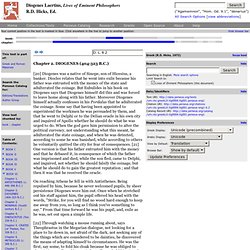

Ancient Greece: A Political, Social, and Cultural History - Sarah B. Pomeroy. Diogenes Laertius, Lives of Eminent Philosophers, BOOK VI, Chapter 2. DIOGENES (404-323 B.C.) Chapter 2.

DIOGENES (404-323 B.C.) [20] Diogenes was a native of Sinope, son of Hicesius, a banker. Diocles relates that he went into exile because his father was entrusted with the money of the state and adulterated the coinage. But Eubulides in his book on Diogenes says that Diogenes himself did this and was forced to leave home along with his father.
Moreover Diogenes himself actually confesses in his Pordalus that he adulterated the coinage. Hesiod: Werke und Tage (deutsche Übersetzung) Werke - Hesiod, Eduard Eyth. Plutos: Ein Lustspeil de Artisophanes - Aristophanes. Hermes. Paratragodia: Untersuchung einer Komischen Form des Aristophanes - Peter Rau.